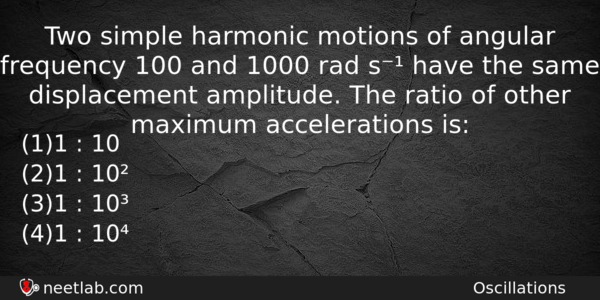| ⇦ | 
| ⇨ |
Two simple harmonic motions of angular frequency 100 and 1000 rad s⁻¹ have the same displacement amplitude. The ratio of other maximum accelerations is:
Options
(a) 1 : 10
(b) 1 : 10²
(c) 1 : 10³
(d) 1 : 10⁴
Correct Answer:
1 : 10²
Explanation:
Maximum acceleration of a particle in the simple harmonic motion is directly proportional to the square of angular frequency i.e., a(max)= – w ² A
As A remains same, we can say
a₁ / a₂ = w₁² / w₂² = (100)² / (1000)² = 1 / 100
⇒ a₁ : a₂ = 1 : 10²
Related Questions: - Mass defect is known as
- A thermocouple of negligible resistance produces an e.m.f. of 40 µV/⁰C in the linear range
- The work done in rotating a magnetic of magnetic moment 2 A-m² in
- A solid cylinder of mass 50kg and radius 0.5 m is, free to rotate about the horizontal axis
- A uranium nucleus ₉₂ U ²³⁸ emits an α-particle and a β-particle in succession.
Topics: Oscillations
(58)
Subject: Physics
(2479)
Important MCQs Based on Medical Entrance Examinations To Improve Your NEET Score
- Mass defect is known as
- A thermocouple of negligible resistance produces an e.m.f. of 40 µV/⁰C in the linear range
- The work done in rotating a magnetic of magnetic moment 2 A-m² in
- A solid cylinder of mass 50kg and radius 0.5 m is, free to rotate about the horizontal axis
- A uranium nucleus ₉₂ U ²³⁸ emits an α-particle and a β-particle in succession.
Topics: Oscillations (58)
Subject: Physics (2479)
Important MCQs Based on Medical Entrance Examinations To Improve Your NEET Score
18000+ students are using NEETLab to improve their score. What about you?
Solve Previous Year MCQs, Mock Tests, Topicwise Practice Tests, Identify Weak Topics, Formula Flash cards and much more is available in NEETLab Android App to improve your NEET score.
Share this page with your friends

Leave a Reply